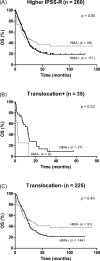Prognostic Impact of IPSS-R and Chromosomal Translocations in 751 Korean Patients with Primary Myelodysplastic Syndrome
- PMID: 27824923
- PMCID: PMC5100959
- DOI: 10.1371/journal.pone.0166245
Prognostic Impact of IPSS-R and Chromosomal Translocations in 751 Korean Patients with Primary Myelodysplastic Syndrome
Abstract
Chromosomal translocations are rare in myelodysplastic syndrome (MDS) and their impact on overall survival (OS) and response to hypomethylating agents (HMA) is unknown. The prognostic impact of the revised International Prognostic Scoring System (IPSS-R) and for chromosomal translocations was assessed in 751 patients from the Korea MDS Registry. IPSS-R effectively discriminated patients according to leukaemia evolution risk and OS. We identified 40 patients (5.3%) carrying translocations, 30 (75%) of whom also fulfilled complex karyotype criteria. Translocation presence was associated with a shorter OS (median, 12.0 versus 79.7 months, P < 0.01). Multivariate analysis demonstrated that translocations (hazard ratio [HR] 1.64 [1.06-2.63]; P = 0.03) as well as age, sex, IPSS-R, and CK were independent predictors of OS. In the IPSS-R high and very high risk subgroup (n = 260), translocations remained independently associated with OS (HR 1.68 [1.06-2.69], P = 0.03) whereas HMA treatment was not associated with improved survival (median OS, 20.9 versus 21.2 months, P = 0.43). However, translocation carriers exhibited enhanced survival following HMA treatment (median 2.1 versus 12.4 months, P = 0.03). Our data suggest that chromosomal translocation is an independent predictor of adverse outcome and has an additional prognostic value in discriminating patients with MDS having higher risk IPSS-R who could benefit from HMA treatment.
Conflict of interest statement
The authors have declared that no competing interests exist.
Figures



Similar articles
-
Report on outcomes of hypomethylating therapy for analyzing prognostic value of Revised International Prognostic Scoring System for patients with lower-risk myelodysplastic syndromes.Ann Hematol. 2016 Oct;95(11):1795-804. doi: 10.1007/s00277-016-2759-y. Epub 2016 Aug 17. Ann Hematol. 2016. PMID: 27530461
-
Outcome of patients with low-risk and intermediate-1-risk myelodysplastic syndrome after hypomethylating agent failure: a report on behalf of the MDS Clinical Research Consortium.Cancer. 2015 Mar 15;121(6):876-82. doi: 10.1002/cncr.29145. Epub 2014 Nov 19. Cancer. 2015. PMID: 25410759 Free PMC article.
-
Prognostic impact of chromosomal translocations in myelodysplastic syndromes and chronic myelomonocytic leukemia patients. A study by the spanish group of myelodysplastic syndromes.Genes Chromosomes Cancer. 2016 Apr;55(4):322-7. doi: 10.1002/gcc.22333. Epub 2015 Dec 22. Genes Chromosomes Cancer. 2016. PMID: 26690722
-
Prognostic models in predicting outcomes in myelodysplastic syndromes after hypomethylating agent failure.Leuk Lymphoma. 2017 Nov;58(11):2532-2539. doi: 10.1080/10428194.2017.1307361. Epub 2017 Mar 28. Leuk Lymphoma. 2017. PMID: 28351181 Review.
-
Role Of TP53 mutations in predicting the clinical efficacy of hypomethylating therapy in patients with myelodysplastic syndrome and related neoplasms: a systematic review and meta-analysis.Clin Exp Med. 2020 Aug;20(3):361-371. doi: 10.1007/s10238-020-00641-4. Epub 2020 Jul 1. Clin Exp Med. 2020. PMID: 32613269
Cited by
-
How I Manage Transplant Ineligible Patients with Myelodysplastic Neoplasms.Clin Hematol Int. 2023 Mar;5(1):8-20. doi: 10.1007/s44228-022-00024-4. Epub 2022 Dec 27. Clin Hematol Int. 2023. PMID: 36574201 Free PMC article. Review.
-
Clinical effect of decitabine in the treatment of myelodysplastic syndrome and influencing factors.Pak J Med Sci. 2020 Jul-Aug;36(5):1084-1088. doi: 10.12669/pjms.36.5.2289. Pak J Med Sci. 2020. PMID: 32704294 Free PMC article.
References
-
- Greenberg P, Cox C, LeBeau MM, Fenaux P, Morel P, Sanz G, et al. International scoring system for evaluating prognosis in myelodysplastic syndromes. Blood. 1997. March 15;89(6):2079–88. - PubMed
MeSH terms
Substances
LinkOut - more resources
Full Text Sources
Other Literature Sources
Medical
Research Materials
Miscellaneous

